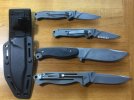All that said above, the pros and cons when used as a knife:
Pros:
-no rust
-tough and resilient
-can be very thin
-easy to maintain, very low maintenance
-lightweight
-resistant to crack propagation
-will not break while batoning or subjected to shock stress
Cons:
-unlikely to compare to the high blade performance of advanced wear-resistant hard steels
-lower hardness and density means can't chop a cinderblock without damage to the thinnest part of the edge
-low density/weight means heavy chopping/cutting requires speed (can be dangerous)
-more likely(?) to get dull when cutting
highly abrasive materials like sandbags
Simply put, titanium, in the right alloy and with the right heat treatment, does function well as a knife and is totally worthwhile to use, and can even become the favorite knife of many users. It's extraordinary as a long blade for several reasons.
Just like amongst the various steels, which are all different, titanium alloy is yet another way to get the job done, with its own quirks, nuances and feel. It by no means displaces steel, but I say it's well worthy of taking a seat with them at the round table of cutlery.



